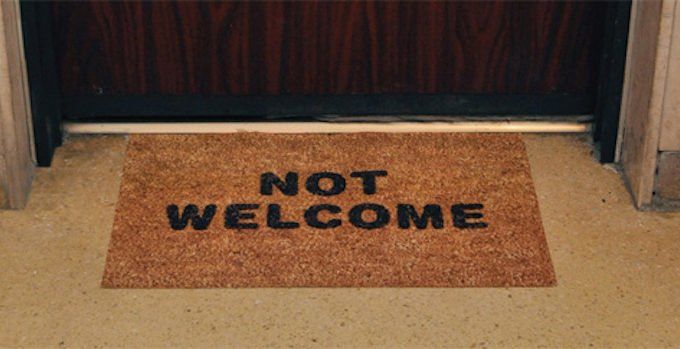CHANGING LAWS IN PROPERTY MANAGEMENT
Jim Rutkowski • February 3, 2020
Keeping abreast of changing laws in property management

Rental property owners throughout the Bay Area have a host of laws to contend with, on the federal, state and local levels. In the past 18 months or so, we have seen a tremendous increase in the amount of information that landlords have been forced to digest. This is not the most fun topic to discuss, but one that has to be broached in order to stay compliant and avoid costly legal mistakes that can be detrimental – if not catastrophic – to your real estate business.
Staying on top of these ever expanding regulatory regimes is difficult for even seasoned, hands-on landlords who invest an enormous amount of time and energy into the day-to-day activities of their rental business. Keeping abreast of the laws is all the more vexing for “accidental” landlords whose heart is not into their enterprise because they didn't want to play landlord - they fell into this role. If this sounds like you, we painted the plight of the accidental landlord, felt your pain, and had a frank conversation
with you earlier.
Here’s some considerations from 40,000 feet.
Rent & eviction controls
Many municipalities throughout the Bay Area have passed ordinances that limit how much rental housing providers can charge tenants, spell out how often the rent can be raised, and enumerate specific reasons why a tenant can be evicted. Still more protections are carved out in these hodge-podge of ordinances, such as minimum lease terms, relocation payment assistance, special notice requirements, buyout agreement regulations, mandated mediation in landlord-tenant conflicts, and other safeguards that
are best journeyed with a property management company that deals with these issues on a daily basis.
What about statewide rent control, anyways?
There are questions that abound concerning The Tenant Protection Act of 2019 (AB-1482), a law that went into effect January 1, 2020. For those of you with rental properties situated in jurisdictions with more onerous, protective rent control and “just cause” eviction rules, you are unfortunately bound to follow these local ordinances. We are speaking to landlords in San Francisco, Oakland, Berkeley, and other cities with a more comprehensive set of regulations.
Although this topic is tricky, our broker of record, Attorney Daniel Bornstein, recently hosted a webinar that broke down the new state law in an easily digestible fashion.
Daniel will be tailoring another educational webinar reserved for valued Bay Property Group clients in the near future - please check your inbox for more
details as they become available.
Rules surrounding security deposits
California has some of the most rigorous security deposit accounting rules in the nation. This process entails a carefully choreographed series of steps with a fiduciary duty on the part of the landlord, carrying with it specialized notice requirements, unforgiving deadlines, and many rights that tenants enjoy.
Read our earlier post: Much insecurity surrounding security deposits...
You can rest assured that one of the first things on the minds of outgoing residents - even before they figure out how to navigate a corner to move a monstrous sofa down the stairs - is when and even if their security deposit will be returned. This is why security deposit disputes are the most common reason landlords are dragged into small claims court.
By letting Bay Property Group manage the relationships with your tenants from the cradle to the grave, you can feel at ease knowing that our meticulous professionals are intimately familiar with the myriad rules surrounding security deposits and you do not have to fret about them.
Compliance with fair housing laws
California defines discrimination much more broadly than federal law, as an ever-expanding pool of rental applicants and tenants are considered to be
part of a “protected class.” Take, for instance, source of income - California makes it illegal for blanket bans on Section 8 tenants.
Local ordinances can also craft their own categories of vulnerable or protected tenants that are entitled to increased safeguards against discrimination or displacement.
As a recent example, Oakland City Council has enacted an ordinance that, with some exceptions, prohibits landlords or their agents from conducting criminal background checks. As a sidebar, Berkeley is expected to vote on a similar measure in February. Following such a wide array of housing laws may not be something you would expect to do in the ordinary course of your rental business, but it's essential information you need to know to survive and thrive. At Bay Property Group, we are heavy consumers of the laws that impact our industry and take the guesswork out of the equation.
One final thought on this point is that most violations of fair housing laws come in the form of ads that invite certain groups to apply for a rental listing, or dissuade another sub-set of tenants from applying, through the select use of words, phrases, symbols, visual aids and other media. These personal preferences are wrongful discrimination under the law, but can be avoided by hiring a professional property management company that can stay far away from these common blunders that haunt landlords down the road.
In parting thoughts
While we’ve only scratched the surface here, suffice it to say there are many perilous legal issues best approached with experienced property managers who know the lay of the land. Add in the many disclosure requirements, the prospect you may have to submit your units to a local rent registry, and lawfully transitioning tenants out of the rental unit if the relationship fails, among other potential pitfalls, it’s easy to see why owners can be daunted.
Bay Property Group can remove the uncertainty.
Share this post

Keeping your home in good condition is a dual responsibility. We are committed to taking good care of our residents, but here is how you can do your part. How to reset a circuit breaker More often than not, when a circuit breaker trips, it is designed to reset and typically does not need to be replaced. Fortunately, there are some easy steps you can take to restore power without the need of a costly service call. READ MORE → Addressing other electrical issues If resetting the circuit breaker doesn't work, here's how to troubleshoot the problem to get the lights turned on. READ MORE → Putting sliding doors back on track Sliding closet doors can be tremendous space-savers, but it can be frustrating when they are knocked off their tracks. READ MORE → Preventing organic growth in the bathroom from shower steam Like a long, hot shower? So does mold. How to prevent and remediate mold in high-humidity conditions. READ MORE → Cleaning greasy kitchen range hoods Peel back your stove's hood and check the exhaust fan filters and you may get a nasty surprise. It may be time to roll up your sleeves. READ MORE → Cleaning out dryer lint Avoid longer dry times, wasted energy, and fire hazards. READ MORE → Resetting your garbage disposal Problems like overheating, clogging, or light fault will indicate a reset by shutting down voluntarily. But the question now is how to reset a garbage disposal. READ MORE → Dealing with a refrigerator freezer iced ove r When frost forms on the shelves of your refrigerator or inside the freezer compartment, there are preventative steps you can take and remedies you can do on your own to get thawed out. READ MORE → Patching small holes in the wall We're not talking about a dark, dingy bar or restaurant. When accidents happen, a hole in the wall can occur. Here's how to make them look like they never happened. READ MORE → Changing batteries in a malfunctioning smoke detectors When sensors become weak and less efficient, don't neglect them and put your household at risk. READ MORE → Replacing light bulbs When they are reachable, replacing burnt out light bulbs are one of the responsibilities of residents and one that can be easily done, with a few caveats. READ MORE →

Loose door knobs or handles are a common problem residents have to deal with at some point, but the good news is it is relatively easy to fix. Remove the knob or handle to separate the doorknob from the splinter shaft, remove the base, find the set of screws and tighten. You can then restore the base and put the handles back on. It is likewise a cinch to tighten the hinges on cabinets and toilets. Please note that most residential leases prohibit residents from tampering with or changing locks and if keys are lost requiring a rekeying, it is the tenant’s responsibility.

To reset a breaker, residents can follow some simple steps. Before anything, turn off any important, electricity-guzzling devices and appliances such as televisions, video game systems, air conditioning units, and the like to prevent damage when the power is reset. Now locate the load center or electrical panel in your home. These are commonly located in garages, basements, or utility closets. Don’t forget to bring a flashlight if the tripped circuit left you in the dark. Next, locate the tripped circuit breaker by finding the one where the handle is in the center or "trip position," or not fully on position. When the circuit breaker is tripped, the handle moves toward the opposition but does not move all the w ay off.

More often than not, if a circuit breaker trips, it is designed to be reset and typically does not need to be replaced. If Bay Property Group has to dispatch an electrician or maintenance staff to resolve an electrical issue that could be easily fixed by the resident, there will be an additional charge for the service call. To reset a breaker, residents can follow some simple steps we outline here » More diagnostics - some questions to ask Is it just one appliance or device that is not working? Check the outlet with another appliance that you know is functioning on another outlet. If the perfectly fine appliance or device is getting power in one outlet but not the other, then there is a glitch with the outlet. In the event that the appliance does not power on with any outlets that you know to be supplying electricity without incident, there is a defect in the equipment you are plugging in. If the appliance is owned by the landlord, contact your property manager. Otherwise, if you personally own the appliance or device, you will, unfortunately, have to repair or replace it at your expense. Is the whole rental unit out of power, just one area of your home, or the entire building or neighborhood? If the electrical outage is isolated to one room or outlet, you should reset the breakers, as discussed above. On the other hand, if you are getting no power anywhere in your home, confirm that the service is properly set up with your utility company or the bill has been timely paid. Moving onto another scenario, if the entire building is out of power, you are advised to check with the utility company for any known issues. If there are no known issues, contact Bay Property Group so that we find the root cause and fix it. When you discover that there is a widespread power outage (perhaps by neighbor accounts or noticing that lights do not work anywhere near your residence), report it to your utility company and they will assuredly address the event. In cases of a large-scale blackout, there is unfortunately little we at Bay Property Group can do but from our experience, these snafus are only temporary. So that we can best deploy our maintenance personnel and other resources to provide the fastest, most efficient service to our residents, we kindly ask that you exhaust some “DIY” measures before calling property management. If our residents have utility service connected and the underlying issue could be solved with a mere resetting of the breakers, in fairness to all tenants, we make it our policy across the board to charge for service calls.

Sliding closet doors can be tremendous space-savers, especially in tight spaces, but it can be frustrating when they are knocked off their tracks. Hopefully, it is a quick and easy fix. When there is debris that might be holding up the door, you can vacuum it out with a crevice attachment. If the door doesn’t slide easily, you can use a lubricant. Other times, you may need to lift the door back on its track. Care should be used so that you did not damage the doors or tracks. If there is a mishap, you may be responsible.

The high humidity with steam showers provides the perfect breeding ground for mold to grow. A vent fan will improve air quality by drawing out moisture and odors from the bathroom, so be sure to always turn it on during and after a shower. You can also be conscientious of keeping the shower door or curtain open when you are done to provide ventilation. Wiping off excessive moisture will go a long way in preventing the consequences of condensation. Using a water/bleach combination or bathroom multipurpose cleaner, spray the shower walls and bathtub. Rinse the surfaces down with water, either from the shower or cups of water, and dry the tiles. Thinking beyond a weekly wipe down and deep cleaning your shower? You can remove the showerhead from the wall and soak it in a 50/50 white vinegar and water mixture in a basin or perhaps, a sealed plastic bag.

If you peek under your stove's hood and check the exhaust fan filters, you might find that it's not pretty. That's because a range hood filter is supposed to collect grease. The filter can get so gunked up over time that it loses its effectiveness, which is why we recommend periodically de-greasing them. Get ready to roll up your sleeves. Your range hood cleanliness begins with dusting to eliminate particles from the surface. We recommend using a dust brush cleaner with a brush that is able to get to delicate and hard-to-reach places. Before doing this, cover the stove with a cloth so that dirt and debris don't fall inside. Let’s move on to cleaning the filters. The first step is to remove filters from the hood. Most filters easily slide or pop out of the underside of the hood. Let the filters soak in a sink or tub with hot or boiling water and a generous squirt of dish soap. Baking soda can also help. Swish around with a brush until the water is soapy and make sure the filters are fully submerged. Once the filters have soaked for 15-20 minutes, use a non-abrasive scrub brush to scrub the filters, adding more dish soap if necessary. Simply rinse the filters in hot water, dry, re-insert the filters back into the hood, and repeat periodically. Cleaning the filters once a month is a general rule of thumb.

Constant cleaning is the key to preventing fire hazards and lowering your energy bill. By not clearing out combustible lint, the dryer becomes a fire hazard. In fact, more than 3,000 fires a year are caused by lint. Your clothes will take longer to dry, as well. It only takes a few seconds to clean your dryer’s lint filter, and this should be done after each and every load. Even if the dryer filter is clean, lint can still build up in the duct that vents outside. Here’s how to clean your dryer inside and out: Unplug your dryer. If it’s a gas dryer, turn the supply valve off while you work to prevent gas from leaking. Pull the dryer away from the wall and disconnect the exhaust duct on the back of the dryer. Loosen up debris with a flexible dryer vent cleaning brush and vacuum out any excess lint. Do the same exercise where the dryer vents outside. Pro tip: If you have a leaf blower, you can insert the blower where the dryer vent begins at the dryer location and allow the air to blow lint out. We recommend you do this thorough cleaning once or twice a year. Of course, you should always turn the dryer off when you are not home and consider attaching a safety alarm to the duct - this can warn you when a dangerous level of lint accumulates.

If frost is forming on the shelves or walls of your refrigerator or inside the freezer compartment, there may be many culprits to blame. Before having a technician work through causes and solutions, there are some steps you can take to avoid getting iced out and remedies you can do on your own to get thawed out. Oftentimes, the temperature for the refrigerator has been set too low or too high and you can adjust the temp setting to correct the problem. In other instances, dirty or dusty coils will throw the compressor into overdrive, making it work harder to maintain a freezing temperature in the freezer. This can result in over cooling. You can pull the refrigerator away from the wall and use a canister vacuum to eliminate the dust from the coils. One of the simplest instructions we can give is to keep doors shut to prevent moist air from being drawn into the appliance. Close the door fully after proper use, check for overstuffed doors, faulty door seals, loose door hinges, and ensure your refrigerator is level so the doors stay closed. More tips: if the refrigerator is close to the wall, keep some distance. This will give it some "breathing room" by allowing extra air to circulate. If you have hot dishes or fresh food being placed in the refrigerator, give them time to cool down before placing them straight in the fridge, as this alters the inside temperature and can lead to ice. Another common cause of ice over is simply too many food items packed in the refrigerator and freezer. There needs to be enough room to allow air to properly circulate.

First, a safety reminder is in order: Never put your hand down into a garbage disposal but instead, use some sort of tool to dislodge any food particles or debris. Although the horror flick images of victims getting limbs severed in a garbage disposal is Hollywood fiction, you can get painfully injured. When the garbage disposal quits out, what you need to know is that these appliances are smarter than one might expect. It is designed to shut off when it is clogged, it overheats, or there is something wrong with the motor. It also comes equipped with a secret red reset button at the bottom. Three easy steps to reset your garbage disposal: Ensure that the disposal switch is in the “OFF” position. Gently press the red button and it does not stay in, wait several minutes and try once again. By turning on a cold stream of water and turning the disposal button to the “ON” position, your garbage disposal should now start running again. If, however, the reset button will not stay in or the overload protector needs to be repeatedly reset, this is an indication that the garbage disposal may need service or require replacement.


